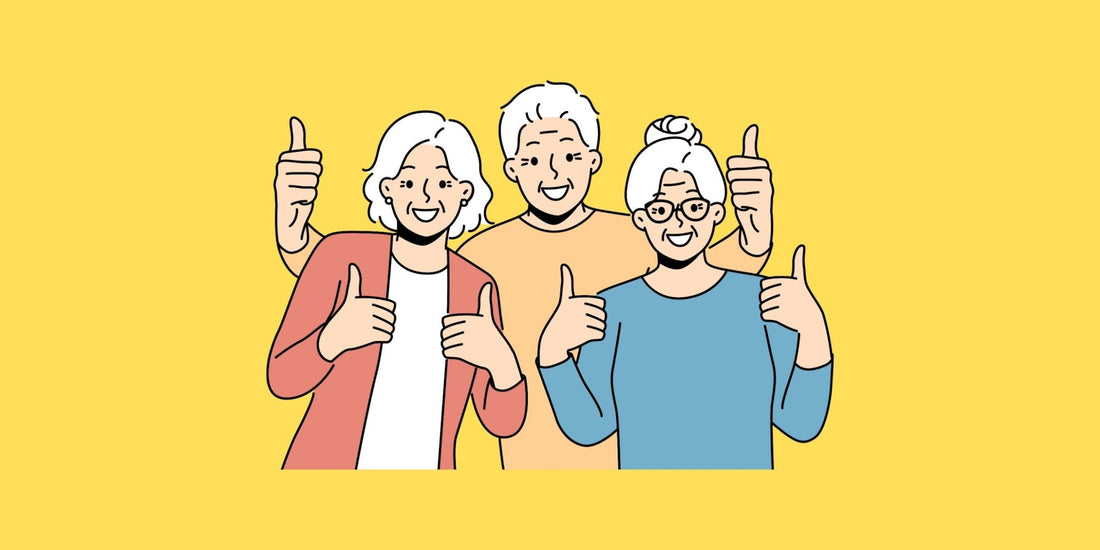
Hangovers and Age: Why They Get Worse as You Get Older
Share
Have you ever noticed that hangovers seem to get worse with age? What might have been a mild headache in your twenties can turn into a full day (or more) of nausea, fatigue, and general discomfort in your thirties, forties, and beyond. But why does this happen, and what can you do about it?
In this blog, we’ll explore the science behind why hangovers worsen as you age, the factors that contribute to this change, and how you can manage and even prevent the dreaded “age-related” hangover.
The Science Behind Hangovers and Age
As we age, our bodies undergo several changes that impact how we metabolise alcohol and recover from a night of drinking. Here are some key reasons why hangovers become more intense as you get older:
1. Slower Metabolism
Metabolism naturally slows down with age, which means your body takes longer to process and eliminate alcohol. When alcohol lingers in your system longer, its toxic by-products, like acetaldehyde, build up, causing more severe hangover symptoms such as headaches, nausea, and fatigue.
2. Reduced Liver Function
The liver, which is responsible for breaking down alcohol, also becomes less efficient with age. As liver function declines, it struggles to process alcohol as quickly, leading to a prolonged hangover. Furthermore, excessive drinking over time can cause liver damage, which further impairs its ability to detoxify alcohol.
3. Lower Water Retention
As you age, your body’s water content decreases. Alcohol is a diuretic, which means it dehydrates you by making you urinate more frequently. With less water in your body to begin with, the dehydrating effects of alcohol become more pronounced, leading to the infamous dry mouth, headaches, and dizziness that are hallmarks of a hangover.
4. Changes in Sleep Quality
Alcohol disrupts the body’s natural sleep cycle, leading to poor-quality rest. As you get older, sleep becomes lighter and more fragmented, meaning that even a small amount of alcohol can interfere with your ability to get restorative sleep. This lack of quality sleep exacerbates hangover symptoms, leaving you feeling sluggish and irritable the next day.
5. Decreased Tolerance
With age, your tolerance for alcohol naturally decreases. The body becomes more sensitive to alcohol’s effects, meaning that even moderate drinking can lead to a more intense hangover. What might have been a casual night of drinking in your twenties can hit much harder in your forties.
How to Manage Hangovers as You Get Older
Fortunately, there are steps you can take to minimise the effects of hangovers as you age. Here are some practical tips for managing and even preventing hangovers as you get older:
1. Pace Yourself
One of the simplest ways to prevent a severe hangover is to drink more slowly. Give your body time to process the alcohol by sipping drinks rather than gulping them down. Opt for drinks with lower alcohol content, such as wine or beer, rather than high-proof spirits.
2. Stay Hydrated
Since dehydration is a major factor in worsening hangovers, it’s essential to stay hydrated before, during, and after drinking. For every alcoholic drink, have a glass of water to replenish lost fluids. Drinking electrolyte-rich beverages can also help to replace essential minerals lost through dehydration.
3. Eat Before You Drink
Food helps slow the absorption of alcohol, giving your liver more time to process it. Eating a balanced meal with healthy fats, proteins, and carbohydrates before drinking can reduce the intensity of hangovers by preventing spikes in blood alcohol levels.
For more tips on the best foods to eat before drinking, visit Healthline’s guide on foods that reduce hangovers.
4. Get Quality Sleep
Since alcohol disrupts your sleep cycle, it’s important to prioritise rest after a night of drinking. Avoid drinking too close to bedtime and try to maintain good sleep hygiene by creating a dark, quiet, and comfortable sleep environment. If possible, take naps or rest the next day to make up for lost sleep.
5. Consider Supplements
Some people find relief from hangovers by taking supplements that support liver function and hydration. Look for supplements that contain ingredients like NAC (N-acetylcysteine), B vitamins, and electrolytes. These can help your body metabolise alcohol more efficiently and replenish lost nutrients.
How to Prevent Hangovers Altogether
If you’re tired of dealing with hangovers, there are ways to prevent them altogether:
1. Drink Less Frequently
The simplest solution to preventing hangovers is to drink less alcohol. Consider taking regular breaks from alcohol, such as participating in Dry January or simply reducing your weekly intake. This gives your body time to recover and can improve overall health.
2. Try Non-Alcoholic Alternatives
There are more non-alcoholic drink options than ever before. From alcohol-free beers and wines to inventive mocktails, you can still enjoy socialising without the aftereffects of alcohol. Many people who adopt a "sober curious" lifestyle find that they enjoy the social experience just as much without drinking.
Explore non-alcoholic options from Dry Drinker and Wise Bartender.
3. Opt for Lighter Drinks
If you don’t want to give up alcohol completely, opt for lighter drinks like low-alcohol beer or wine spritzers. These have a lower alcohol content, which can help reduce the severity of hangovers.
The Changing Social Landscape of Drinking and Aging
As people age, their relationship with alcohol often evolves. In the past, drinking might have been central to socialising, but many people find that as they get older, they prioritise their health and well-being over drinking. The rise of the "sober curious" movement has made it more acceptable to reduce or even eliminate alcohol from social situations without feeling left out.
Whether you’re cutting back for health reasons or simply because hangovers are no longer worth it, remember that socialising without alcohol can still be enjoyable and fulfilling.
